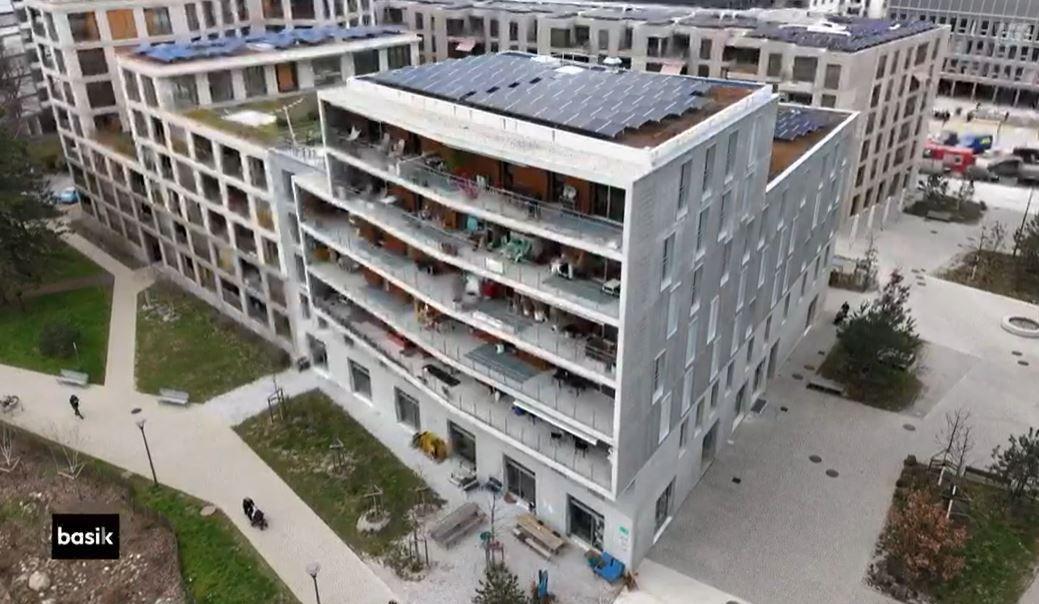
Housing Co-Operatives Offer Swiss Alternative To Rising Rents
A new urban area is rising north of Lausanne, in Plaines du Loup, where financing models and lifestyles may differ, but the objective remains the same: to provide an alternative to the traditional housing market.
By 2034, this eco-district is expected to accommodate 8,000 residents and 3,000 jobs. The first phase, to be completed by early 2025, will prioritise co-operative housing, which will represent a quarter of the units.
A hybrid model between renting and owningA housing co-operative is a not-for-profit organisation that aims to provide homes at rents that are typically 15% to 20% lower than market prices. Each member has one vote and one share in the co-operative, but no ownership of the property itself.
Founded in 1920, the Société Coopérative d'Habitation Lausanne (SCHL) is one of Switzerland's largest housing co-operatives. Its property manager, Daniel Brühlart, explained how it works on Basik:“We have more than 8,200 members. They buy shares at CHF300 ($350) each, helping to build equity for the co-operative.”
New members are required to contribute CHF900 upfront, plus CHF900 per room in their flat. In exchange, they enjoy lower rents.“For a 91 m2 four-room flat, we pay a net rent of CHF1,750 – that's really fair,” says co-op member Stéphane Delanis.
A co-operative of committed residentsAlso in Lausanne, La Meute goes beyond affordable housing by promoting a social mission. The development includes 24 homes, some reserved for migrants, artists and students, along with a community café and contemporary art centre.
“Here we're trying to foster connection, solidarity and a new way of living together,” explains co-operative member Annabel Glauser. A key feature of La Meute is its self-management: members handle everything from drafting tenancy agreements to maintenance and repairs. This keeps costs low but requires time and commitment.“I spend an average of three to four hours a week,” she says.
The buy-in is higher – around CHF20,000 per flat – but members can reclaim the money when they move out.
Bridging renting and ownershipLe Bled offers a hybrid approach combining tenants and owners. Samuel Bendahan, president of the Lausanne-based co-operative, outlines their unique concept:“A tenant pays for 100 square metres, but five of those are communal. For an owner, that's 20 square metres.”
This arrangement enables the creation of a wide range of shared spaces, such as performance halls, music rooms, children's play areas and DIY workshops.
“We bought our 97m2 four-room flat for CHF650,000 – well below the market price,” says co-op owner Filippo Gander. However, the resale price is capped for 25 years to prevent speculation.
Co-operative housing still rareDespite their appeal, housing co-operatives make up just 4% of Switzerland's housing stock. Daniel Brühlart attributes this to limited access to land.“In the open market, we're often outbid by property investment funds, which offer two to three times more than we can.”
The expansion of housing co-operatives requires political backing. Bendahan, also a politician in the left-wing Social Democratic Party, notes:“Without targeted support, such as public housing loans, these projects would be far harder to realise.”
While often associated with left-wing politics, co-operatives have also gained support from centre-right parties in some municipalities. Their future growth will largely depend on policy decisions that improve access to land and financing.
Translated from French using DeepL/amva/ts
External ContentIn compliance with the JTI standards
More: SWI swissinfo certified by the Journalism Trust Initiative
You can find an overview of ongoing debates with our journalists here . Please join us!
If you want to start a conversation about a topic raised in this article or want to report factual errors, email us at ... .

Legal Disclaimer:
MENAFN provides the
information “as is” without warranty of any kind. We do not accept
any responsibility or liability for the accuracy, content, images,
videos, licenses, completeness, legality, or reliability of the information
contained in this article. If you have any complaints or copyright
issues related to this article, kindly contact the provider above.















Comments
No comment